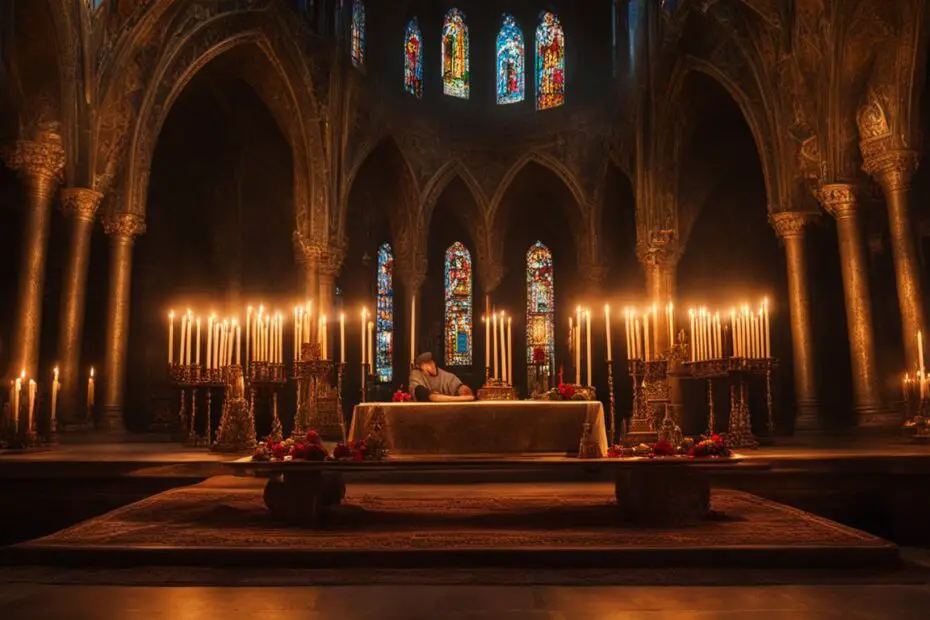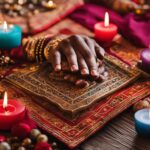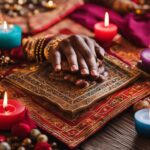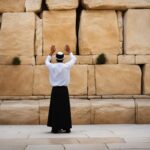Prayer is a practice that varies across different cultures and religions. While some may view prayer as a ritualistic act, others see it as a personal and intimate connection with the divine. This article delves into the question of whether prayer is a ritual and explores the significance of prayer rituals in various religious practices.
Key Takeaways:
- Prayer rituals can be defined as prescribed actions, words, or gestures performed during prayer.
- These rituals vary depending on the religious tradition and can include specific prayers, chants, postures, or rituals associated with sacred objects.
- Prayer rituals have a deeper spiritual meaning, serving as a way to express devotion, seek guidance, and cultivate mindfulness.
- Performing prayer rituals may involve specific steps or guidelines depending on one’s religious tradition.
- Regular engagement in prayer rituals has been linked to various physical and psychological benefits, including a sense of peace and emotional well-being.
The Definition of Prayer Rituals
Prayer rituals play a significant role in religious practices, serving as structured and intentional acts of devotion and connection with the divine. These rituals can vary widely across different religions and cultures, encompassing various actions, words, and gestures. Understanding the definition of prayer rituals is essential for recognizing their importance and significance.
Prayer rituals can be defined as prescribed actions, words, or gestures performed during prayer. These rituals are often deeply rooted in religious traditions and hold deep symbolic meaning for believers. The types of prayer rituals can vary depending on the religious tradition and cultural context in which they are practiced.
Table: Types of Prayer Rituals
| Type of Ritual | Description |
|---|---|
| Prostration | A ritual involving bowing or kneeling as a sign of reverence and submission. |
| Chanting | The repetition of sacred words or phrases to create a meditative and contemplative atmosphere. |
| Meditation | A practice of quieting the mind and focusing on spiritual contemplation. |
| Offerings | The presentation of gifts or symbolic items as a way to express gratitude and devotion. |
| Prayer beads | The use of beads or rosaries to keep count and aid in reciting prayers. |
These types of prayer rituals are found in various religious traditions, including Christianity, Islam, Buddhism, Hinduism, and Judaism. The specific rituals may vary within each tradition, reflecting unique cultural practices and theological beliefs.
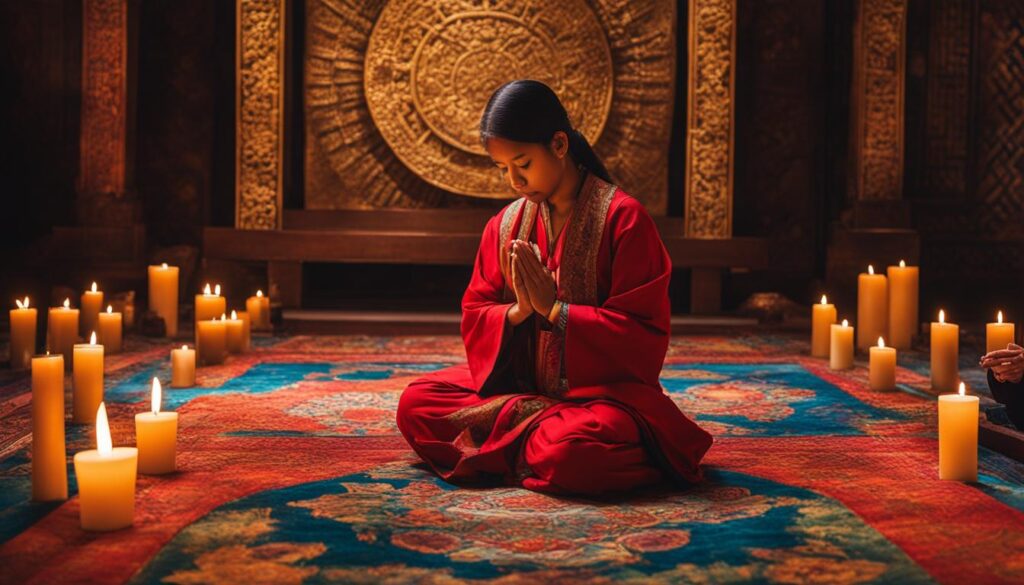
The Spiritual Meaning of Prayer Rituals
Prayer rituals hold a profound spiritual meaning for those who practice them. They provide a way to express devotion, seek guidance, and connect with the divine in a deeper sense. These rituals offer a framework for individuals to cultivate mindfulness, focus, and a sense of spiritual awareness in their daily lives.
Through prayer rituals, individuals can tap into a higher power and establish a profound connection with their spirituality. They serve as a means to access inner peace, comfort, and emotional well-being. The act of engaging in prayer rituals can create a sacred space where individuals feel a sense of tranquility and solace.
Prayer rituals provide a sacred space for individuals to find solace, connect with the divine, and cultivate a deeper understanding of their spirituality.
Furthermore, prayer rituals foster a strong sense of community and belonging. They create opportunities for individuals to engage in shared worship, participate in religious ceremonies, and connect with others who share similar beliefs and values. Prayer rituals are often performed together, reinforcing a sense of unity and collective spiritual practice.
In conclusion, prayer rituals hold a deep spiritual significance for individuals across various religious traditions. They offer a way to express devotion, seek guidance, and foster a connection with the divine. These rituals provide a sense of peace, comfort, and emotional well-being, while also cultivating mindfulness, focus, and a sense of community. Through prayer rituals, individuals can nourish their spiritual well-being and deepen their connection with the divine.
| Benefits of Prayer Rituals | Spiritual | Emotional | ||
|---|---|---|---|---|
| Meaningful Connection with the Divine | Enhanced Spiritual Awareness | Inner Peace and Tranquility | Emotional Well-being | |
| Community and Unity | Sense of Belonging | Comfort and Solace | ||
How to Perform Prayer Rituals
Performing prayer rituals can be a deeply meaningful and spiritual experience. The exact method of performing prayer rituals can vary depending on the religious tradition, but there are common steps and guidelines that can be followed. Here are some general steps for performing prayer rituals:
- Purification: Many prayer rituals begin with a purification process to cleanse the mind and body. This may involve washing the hands, face, or feet, or engaging in a symbolic act of purification.
- Posture: Adopting a specific posture is often an important aspect of prayer rituals. This can vary across different traditions and may include standing, sitting, kneeling, or prostrating. The posture chosen can reflect reverence and humility towards the divine.
- Recitation: Prayer rituals often involve reciting specific prayers, chants, or verses. These sacred words are believed to create a connection with the divine and express one’s intentions, gratitude, or supplications. The recitation can be done silently or aloud, depending on personal preference.
- Gestures: Certain hand gestures or movements may be incorporated into prayer rituals. These gestures can have specific meanings and symbolism within a religious tradition. Examples include placing the hands together in a prayer position, raising the hands in praise, or bowing the head in reverence.
- Focus and Intentions: Prayer rituals require focused attention and mindfulness. It is important to center one’s thoughts and intentions on the divine during the prayer ritual. This can be done by quieting the mind, letting go of distractions, and cultivating a sense of presence.
It’s important to note that these steps are general guidelines and may vary based on individual beliefs and specific religious practices. It is recommended to consult religious texts, teachings, or seek guidance from knowledgeable individuals within the religious tradition to ensure the proper observance of prayer rituals.
Example Table: Traditional Prayer Rituals in Different Religions
| Religion | Prayer Ritual | Key Elements |
|---|---|---|
| Christianity | The Lord’s Prayer | Recitation of specific prayer, often in a communal setting |
| Islam | Salah (Muslim Prayer) | Specific postures (standing, bowing, prostrating), recitation of verses from the Quran |
| Buddhism | Meditation and Chanting | Focused meditation, recitation of mantras or sacred texts |
| Hinduism | Aarti | Circulation of a lamp or flame in front of deities, accompanied by chants and prayers |
| Judaism | Shema | Recitation of a central Jewish prayer, often with specific hand movements |
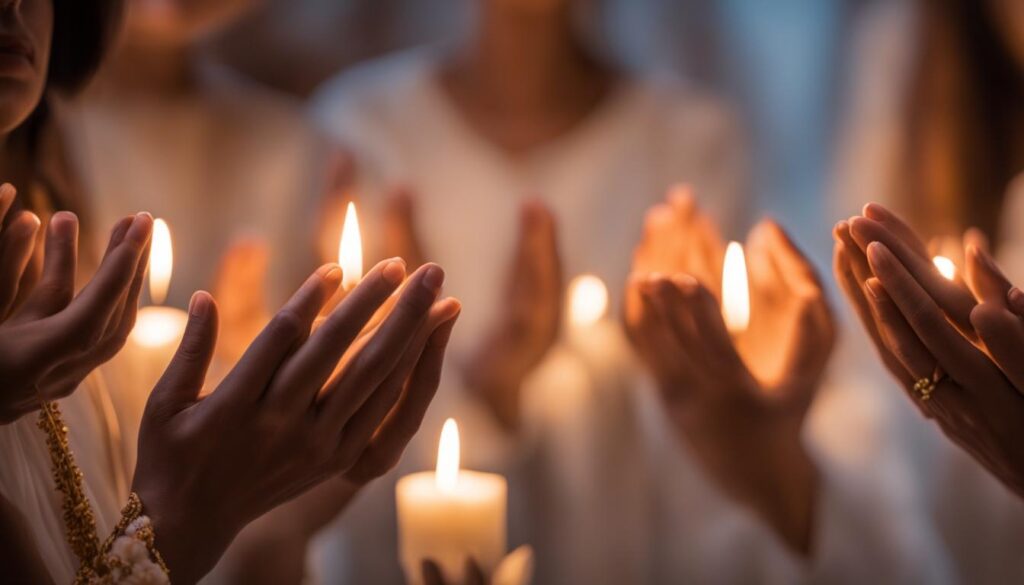
“Prayer is not asking. It is a longing of the soul. It is daily admission of one’s weakness. It is better in prayer to have a heart without words than words without a heart.” – Mahatma Gandhi
Remember that prayer rituals are a personal and sacred practice. They allow individuals to connect with the divine, express their faith, and seek spiritual solace. Embrace the steps and elements of prayer rituals that resonate with your beliefs and find meaning in the process. Whether performed in a structured manner or adapted to suit personal needs, prayer rituals can be a powerful tool for spiritual growth and connection.
The Benefits of Prayer Rituals
Regular engagement in prayer rituals has been linked to various benefits, both physical and psychological. These rituals provide individuals with a sense of structure and purpose, offering a dedicated time and space for spiritual connection and reflection. This can lead to a greater sense of peace, comfort, and emotional well-being.
Prayer rituals also have the potential to enhance feelings of gratitude, compassion, and resilience. By engaging in regular prayer rituals, individuals are encouraged to express gratitude for the blessings in their lives, fostering a positive mindset and a greater appreciation for the present moment. Additionally, prayer rituals can cultivate compassion by encouraging individuals to pray for the well-being of others and to develop empathy towards those in need.
“Regular engagement in prayer rituals has been linked to various benefits, both physical and psychological.”
Furthermore, prayer rituals can help individuals build resilience in the face of challenges and adversity. By turning to prayer during difficult times, individuals can find solace and inner strength. Prayer rituals provide a sense of comfort and support, reminding individuals that they are not alone in their struggles and that there is a higher power guiding and supporting them.
| Benefits of Prayer Rituals | Advantages of Regular Prayer Rituals |
|---|---|
| Enhanced emotional well-being | Greater sense of peace and comfort |
| Increase in gratitude and compassion | Development of empathy towards others |
| Build resilience and inner strength | Find solace during difficult times |
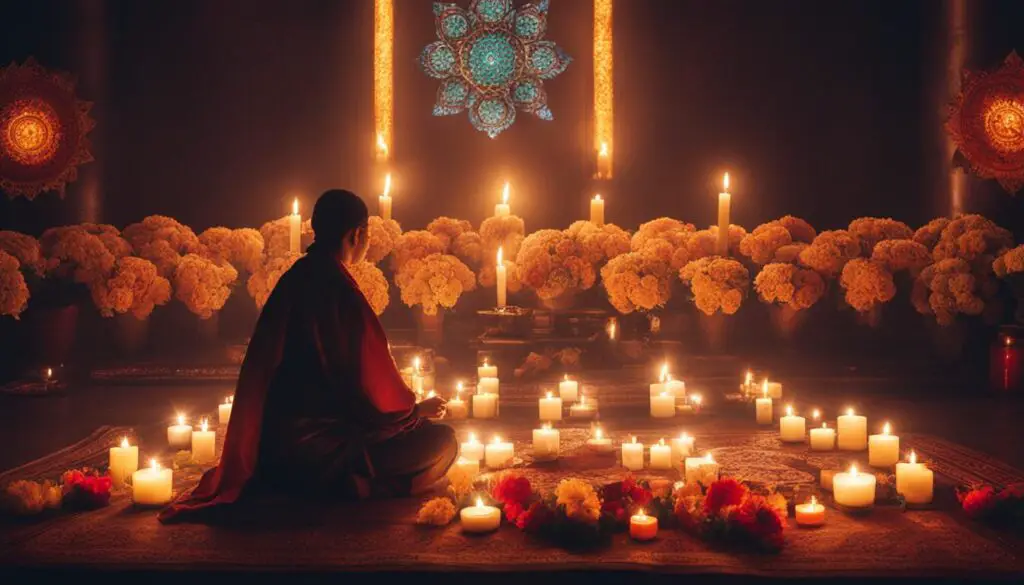
Overall, regular engagement in prayer rituals offers individuals a range of physical, emotional, and spiritual benefits. These rituals provide a meaningful and intentional way to connect with the divine, cultivate positive emotions, and navigate life’s challenges with resilience. Whether performed individually or in a communal setting, prayer rituals have the power to enhance one’s overall well-being and foster a deeper sense of spirituality.
The Importance of Prayer Rituals in Religion
Prayer rituals hold immense significance in the practice of religion. They serve as a fundamental way for believers to express their devotion, seek guidance from the divine, and foster a sense of community and unity. These rituals often form an integral part of religious ceremonies, festivals, and daily or weekly worship services, establishing a deep connection between individuals and their faith.
One of the primary roles of prayer rituals is to worship and praise the divine. Through these rituals, individuals offer their reverence and adoration, acknowledging the power and presence of the divine in their lives. By engaging in prayer rituals, believers can strengthen their faith and deepen their spiritual connection, finding solace and comfort in their religious practices.
Prayer rituals also provide a space for believers to seek divine intervention and guidance. They serve as a means of communication with the divine, allowing individuals to express their hopes, fears, and desires. Through prayer rituals, believers find solace in knowing that their concerns are heard and that they are guided by a higher power.
Furthermore, prayer rituals play a vital role in fostering a sense of community and unity among believers. In many religious traditions, prayer rituals are performed collectively, bringing individuals together in a shared spiritual experience. These rituals create a sense of belonging and connectedness, reinforcing the bonds between individuals and their religious community.
Overall, prayer rituals are integral to religious practices as they provide believers with a means to worship, seek guidance, and foster community. These rituals are deeply intertwined with the spiritual fabric of individuals and their religious traditions, allowing them to cultivate a profound sense of connection with the divine and their fellow believers.
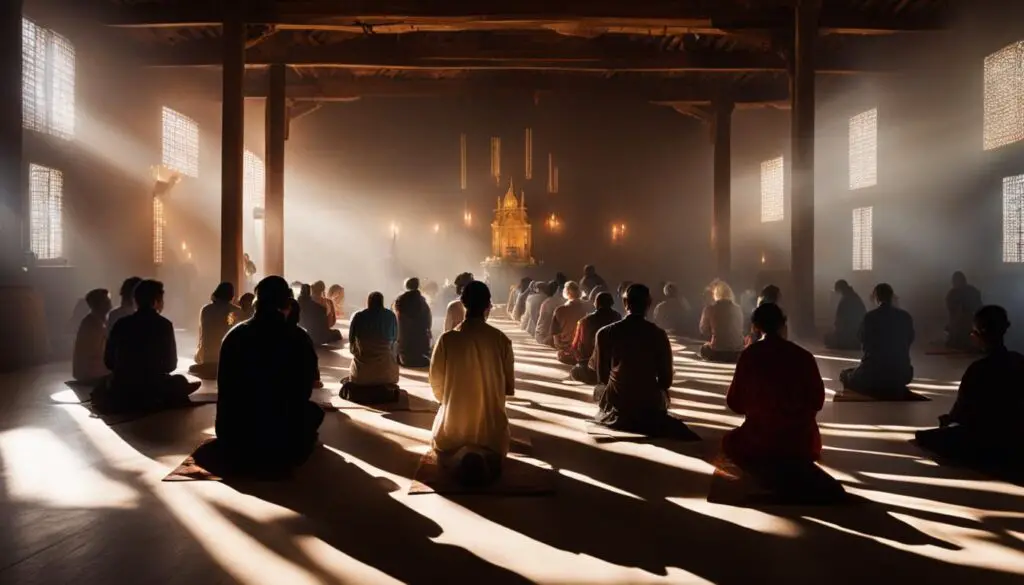
Exploring Different Perspectives on Prayer Rituals
Prayer rituals evoke varying beliefs and perspectives among individuals, shaped by personal experiences, cultural influences, and religious teachings. While some view prayer rituals as integral to their spiritual practice, others may question their necessity or even consider them harmful. These diverse viewpoints offer insight into the multifaceted nature of prayer rituals and highlight the complex relationship individuals have with these practices.
For many, prayer rituals provide a tangible way to connect with the divine and express their devotion. These individuals may find solace, peace, and a sense of spiritual fulfillment through the structured nature of prayer rituals. They see these rituals as a means to establish a deeper connection with the divine and seek guidance in their daily lives.
On the other hand, some individuals may hold different beliefs about the role and significance of prayer rituals. They may view prayer as a more personal and inward experience, not requiring specific rituals or external expressions. These individuals may prefer a more spontaneous and unstructured approach to their spiritual practice, finding that it allows for a greater sense of authenticity and freedom.
“Prayer rituals can bring a sense of structure and purpose, providing a framework for individuals to connect with their faith and engage in a communal spiritual practice.”
It’s important to recognize the varying perspectives on prayer rituals and understand that there is no one-size-fits-all approach. Each individual’s spiritual journey is unique, and their beliefs and practices should be respected. Whether one chooses to embrace prayer rituals as a central part of their religious practice or approaches prayer in a more individualized manner, both paths can lead to a deepening of one’s relationship with the divine.
The Role of Prayer Rituals in Personal Spiritual Practices
Prayer rituals play a significant role in the personal spiritual practices of individuals. These rituals provide a structured and intentional way to connect with the divine on a regular basis, fostering a sense of grounding, purpose, and spiritual growth. Incorporating prayer rituals into daily life can be a transformative experience, allowing individuals to deepen their spiritual connection and cultivate a sense of inner peace.
One of the key benefits of incorporating prayer rituals into daily life is the opportunity for self-reflection and mindfulness. Prayer rituals create a sacred space where individuals can pause, reflect on their thoughts and emotions, and gain clarity and perspective. This daily practice can help individuals navigate the challenges and stresses of life with a greater sense of calm and resilience.
“Prayer is not asking. It is a longing of the soul. It is daily admission of one’s weakness. It is better in prayer to have a heart without words than words without a heart.” – Mahatma Gandhi
Furthermore, prayer rituals provide a sense of continuity and consistency in an ever-changing world. By establishing a regular prayer routine, individuals can maintain a sense of spiritual discipline and commitment. This dedication to prayer rituals can deepen one’s faith and strengthen their connection with the divine, providing a source of comfort and guidance in both good times and challenging moments.
Table: The Benefits of Incorporating Prayer Rituals into Daily Life
| Benefits | Description |
|---|---|
| Enhanced Spiritual Connection | Regular prayer rituals deepen the spiritual connection with the divine and foster a sense of inner peace. |
| Self-Reflection and Mindfulness | Prayer rituals provide a sacred space for self-reflection, enabling individuals to gain clarity and perspective. |
| Consistency and Continuity | A regular prayer routine establishes spiritual discipline and commitment, providing comfort and guidance. |
Incorporating prayer rituals into daily life is a personal journey that can vary greatly based on individual preferences and beliefs. Some individuals may choose to integrate short moments of prayer throughout their day, while others may set aside dedicated time for more elaborate prayer rituals. The key is to find a practice that resonates with one’s spiritual needs and allows for a meaningful connection with the divine.
By incorporating prayer rituals into daily life, individuals can nurture their spiritual well-being, experience a deeper sense of connection, and find solace and guidance in the divine presence. Whether it is a few minutes of silent contemplation or a longer prayer ceremony, the role of prayer rituals in personal spiritual practices is paramount.
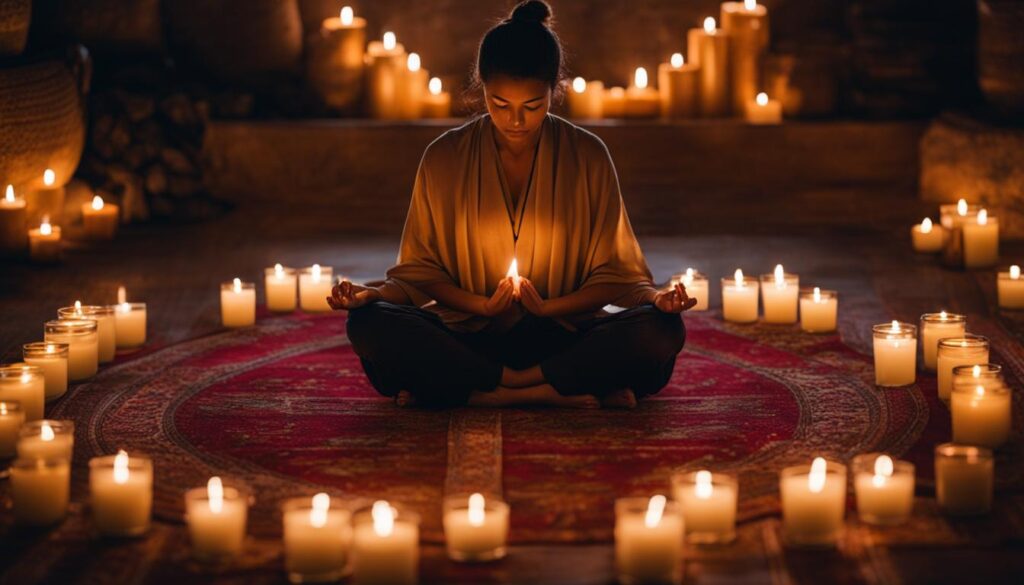
The Intersection of Prayer Rituals and Personal History
Prayer rituals are deeply intertwined with an individual’s personal history, influenced by their cultural and familial background. These factors shape one’s understanding and practice of prayer rituals, providing a unique lens through which they are experienced and interpreted.
Cultural traditions play a significant role in shaping prayer rituals. Different cultures have their own customs, beliefs, and practices surrounding prayer, which are passed down through generations. For example, in some cultures, prayer rituals may involve specific postures, gestures, or chants that are deeply rooted in their cultural heritage. These rituals serve as a way to connect with their ancestors and maintain a sense of cultural identity.
Familial influences also play a vital role in shaping an individual’s engagement with prayer rituals. Families often have their own traditions and practices when it comes to prayer, which are passed down from parents to children. These familial rituals create a sense of belonging and continuity, fostering a connection with one’s family history and values.
“Prayer rituals are not just a religious practice; they are a reflection of one’s personal history, culture, and upbringing.”
Over time, an individual’s personal history and experiences may also shape their prayer rituals. As one explores their own spiritual path, they may adopt new practices or modify existing rituals to align with their beliefs and experiences. This personalization allows prayer rituals to evolve and grow alongside an individual’s evolving spiritual journey.
| Prayer Rituals | Personal History Influence |
|---|---|
| Lighting a candle | Influenced by cultural tradition of lighting candles in times of prayer and reflection. |
| Meditation | Inspired by personal experiences with mindfulness and the benefits of quiet reflection. |
| Reciting specific prayers | Learned from family members and passed down through generations. |
Ultimately, prayer rituals are not just a religious practice; they are a reflection of one’s personal history, culture, and upbringing. They provide a way for individuals to honor their heritage, connect with their families, and express their spirituality in a meaningful and authentic way.
Freedom and Personalization in Prayer Rituals
When it comes to prayer rituals, one of the key aspects that individuals have the freedom to explore and embrace is personalization. Prayer rituals offer a unique opportunity for individuals to connect with the divine in a way that aligns with their beliefs, experiences, and spiritual journey. With personalization, individuals can shape their prayer rituals to reflect their own unique perspectives and preferences, allowing for a more authentic and meaningful engagement with prayer.
Personalization in prayer rituals can take various forms, depending on an individual’s religious tradition and personal preferences. It may involve selecting specific prayers or chants that resonate with one’s beliefs and intentions, choosing postures or gestures that facilitate a deeper sense of connection, or incorporating sacred objects or symbols that hold personal significance. The freedom to personalize prayer rituals allows individuals to create a practice that feels personally meaningful and enriching.
Through personalization, prayer rituals can become a deeply transformative and empowering practice. By adapting prayers, gestures, or even the timing and setting of prayer, individuals can enhance their sense of connection, devotion, and spiritual growth. Personalization also enables individuals to navigate prayer rituals in a way that is authentic to their own experiences and beliefs, fostering a deeper sense of resonance and fulfillment in their spiritual journey.
Benefits of Personalized Prayer Rituals
Personalized prayer rituals offer a range of benefits that contribute to an individual’s overall spiritual well-being. These benefits include:
- Enhanced sense of connection: Personalized prayer rituals allow individuals to cultivate a stronger sense of connection with the divine, fostering a deeper spiritual connection.
- Increased mindfulness and focus: By tailoring prayer rituals to personal preferences, individuals can engage in a practice that promotes mindfulness and focus, enabling a deeper level of presence during prayer.
- Greater authenticity: Personalized prayer rituals offer the opportunity to express one’s beliefs, intentions, and emotions in a way that feels true and authentic to the individual.
- Emotional healing and growth: By personalizing prayer rituals, individuals can create a space for emotional healing, growth, and self-reflection, allowing for a more holistic spiritual experience.
Personalization in prayer rituals is a testament to the dynamic and diverse nature of religious and spiritual practices. It underscores the importance of individual agency and autonomy in the realm of prayer, allowing for a deeper, more meaningful engagement with the divine.
Exploring Prayer as a Daily Ritual
Integrating prayer into daily life can bring a sense of purpose, mindfulness, and spiritual nourishment. Many individuals view prayer as a daily ritual, incorporating it into their regular routines and schedules. Whether practiced individually or in community, daily prayer rituals can serve as anchor points throughout the day, allowing for moments of reflection, expression, and connection.
The act of engaging in daily prayer rituals provides an opportunity for individuals to pause, center themselves, and connect with the divine. It offers a dedicated time and space to express gratitude, seek guidance, and cultivate a deeper sense of spirituality. By integrating prayer into their daily lives, individuals can infuse their activities with a sense of meaning and align their actions with their inner beliefs and values.
“Prayer is not asking. It is a longing of the soul. It is daily admission of one’s weakness. It is better in prayer to have a heart without words than words without a heart.” – Mahatma Gandhi
Furthermore, prayer as a daily ritual can foster a sense of discipline and consistency in one’s spiritual practice. Just as physical exercise yields greater benefits with regularity, the same applies to prayer rituals. By making prayer a part of their daily routine, individuals can establish a deep and continuous connection with the divine, allowing for ongoing spiritual growth and transformation.
The Benefits of Daily Prayer Rituals
| Benefits | Description |
|---|---|
| Enhanced Mental Well-being | Regular prayer rituals can provide a sense of peace, reduce stress, and enhance overall mental well-being. |
| Strengthened Focus and Clarity | Engaging in prayer as a daily ritual can improve concentration, focus, and clarity of thought. |
| Deepened Spiritual Connection | Prayer rituals can foster a deeper connection with the divine and a greater sense of purpose and meaning in life. |
| Cultivated Compassion and Gratitude | Regular prayer rituals can cultivate qualities such as compassion, gratitude, and humility. |
| Increased Resilience | Prayer rituals provide solace, strength, and resilience in times of difficulty, offering a source of comfort and support. |
Overall, prayer as a daily ritual offers individuals a transformative and meaningful way to infuse their lives with spirituality, mindfulness, and a deeper connection with the divine. By integrating prayer into daily routines, individuals can experience the profound benefits of this practice and create a sacred space in their lives for reflection, growth, and gratitude.
Conclusion
In conclusion, prayer is a multifaceted practice that holds deep significance in various religions and spiritual traditions. Prayer rituals serve as a means for individuals to express their devotion, seek guidance, and foster a connection with the divine. These rituals can take different forms, including specific prayers, postures, gestures, and the use of sacred objects.
The spiritual meaning and interpretation of prayer rituals may differ among individuals and religious communities. However, they consistently play a central role in religious ceremonies and daily spiritual practices. Prayer rituals provide a structured framework for believers to engage in acts of worship, cultivate mindfulness, and strengthen their faith.
Moreover, prayer rituals offer numerous benefits to practitioners. Engaging in regular prayer rituals has been associated with emotional well-being, a sense of peace, and an increased feeling of connectedness with the divine. Prayer rituals also foster qualities such as gratitude, compassion, and resilience.
Whether performed in a specific ritualistic manner or integrated into daily life, prayer rituals offer individuals a pathway to nurture their spiritual well-being and establish a profound connection with the divine.
FAQ
Is prayer always considered a ritual?
Prayer can be viewed as a ritual in some religious traditions, but it can also be seen as a personal and intimate connection with the divine.
What are prayer rituals?
Prayer rituals are prescribed actions, words, or gestures performed during prayer. They can vary widely depending on the religious tradition and may include specific prayers, chants, postures, or rituals associated with sacred objects.
What is the significance of prayer rituals?
Prayer rituals serve as a way to express devotion, seek guidance, connect with the divine, and cultivate mindfulness and focus. They also provide a structure and framework for individuals to express their faith and engage in communal spiritual practice.
How do you perform prayer rituals?
The method of performing prayer rituals can vary depending on the religious tradition. It may involve purification rituals, specific prayers or chants, specific postures or gestures, and the use of sacred objects or symbols. It is important to refer to the teachings and practices of one’s own religious tradition.
What are the benefits of prayer rituals?
Regular engagement in prayer rituals has been linked to various benefits, including a sense of peace, comfort, emotional well-being, a deeper understanding of oneself and one’s place in the world, as well as enhanced feelings of gratitude, compassion, and resilience.
What is the role of prayer rituals in religion?
Prayer rituals play a crucial role in many religious traditions. They are a way to worship and praise the divine, seek divine intervention and guidance, and foster a sense of community and unity among believers. Prayer rituals often serve as a central component of religious ceremonies, festivals, and worship services.
How do different people view prayer rituals?
People hold varying beliefs and perspectives on prayer rituals. Some view them as essential to their religious practice, while others may see them as unnecessary or even harmful. Individual interpretations and experiences of prayer rituals can greatly differ, influenced by personal beliefs, cultural upbringing, and religious teachings.
How do prayer rituals fit into personal spiritual practices?
For many individuals, prayer rituals form an integral part of their personal spiritual practices. These rituals provide a structured and intentional way to connect with the divine on a regular basis, offering grounding, purpose, and spiritual growth.
How does personal history influence prayer rituals?
An individual’s personal history, including their cultural and familial background, can have a significant impact on their perception and practice of prayer rituals. Cultural traditions and familial customs often shape one’s understanding and engagement with prayer rituals.
Can prayer rituals be personalized?
Yes, with the freedom and choice available in modern religious practice, individuals have the opportunity to personalize their prayer rituals. This allows for a more authentic and meaningful engagement with prayer, aligning practices with beliefs and experiences.
Can prayer be a daily ritual?
Yes, many individuals view prayer as a daily ritual, incorporating it into their regular routines and schedules. Daily prayer rituals provide structure, mindfulness, and spiritual nourishment, allowing for moments of reflection, expression, and connection.


